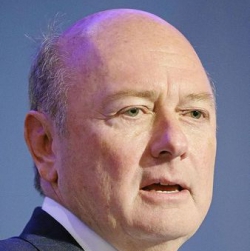Former Oklahoma State Senator Rick Brinkley pleaded on Thursday to a federal fraud charge. In his plea deal, the 54-year old Oklahoma politician, who had been in office since 2010, said he took more than $1.8 million from the Better Business Bureau of Tulsa while he worked there.
Such blatant corruption in a public official at the Better Business Bureau would be shocking, in and of itself. The BBB is supposed to fight against corrupt practices. But Sen. Brinkley’s reason for that corruption was his love of gambling. The state senator ran up big gambling debts and needed to make up the difference, so he committed fraud.
Rick Brinkley’s Gambling Addiction
In his plea agreement, Rick Brinkley said, “I used BBB’s credit card to make cash withdrawals at automated teller machines located within casinos to support my gambling habit.”
The presiding judge in the case explained how an audit of the senator’s finances showed a pattern of excessive gambling. US Judge Danny C. Williams said, “There were significant amounts of money–several hundreds of thousand of dollars–withdrawn from ATMs from different casinos, Vegas trips, things of that nature.”
The judge added in his formal ruling, “We don’t know what his game of preference was, other than he liked the casinos.”
Brinkley Resigned His Office
Also on Thursday, Sen. Rick Brinkley resigned his office in the Oklahoma Senate, effective immediately. His resignation was made with a letter. The senator said he hopes to spend time with his family away from the public view.
In the immediate future Brinkley is likely going to have to spend time in federal prison. The maximum sentence for his crime is 37 months of incarceration. Because this is his first offense and he made a plea bargain the case, the sentence might be lighter than the maximum allowed under the law.
Fraud in Excess of $1.8 Million
Still, he stole nearly $2 million from an office meant to help consumers, so the sentencing judge is likely to take the crime itself into account. Sentencing before US District Judge Claire Egan is set for November 20.
As is often the case with crimes stemming from gambling, one crime led to a number of other crimes, including tax evasion. Brinkley might have to settle with the IRS at some later date, but the plea bargain ends his prosecution by the U.S. Department of Justice. Charges had been filed in a Tulsa federal court on Wednesday. In that filing, US Attorneys had alleged Rick Brinkley had been stealing money from the Better Business Bureau since as early as 2005.
Diverted BBB Money for Cash
In his plea statement, Brinkley described his crimes and gambling activities. He wrote, “I made efforts to conceal my fraudulent use of BBB funds. I falsified the names of BBB vendors, created…false invoices and diverted BBB money for cash. I failed to report the monies and funds that I diverted from BBB as income on my federal tax returns.”
According to a News OK newspaper report, the lawmaker has sought treatment for his compulsive gambling, which could help him in the eyes of the judge. He spent 60 days this summer in a Louisiana treatment facility for gambling addiction. At the moment, Brinkley is active in Gamblers Anonymous.
Rick Brinkley Profile
Before the current scandal, Rick Brinkley was a respected politician. After he won the Republican nomination for his seat in 2010 and 2014, he ran unopposed. Before his time as a politician, Brinkley had been a pastor, a writer, television producer, an investigative producer, and an on-air personality. Prior to launching his political career, the pastor had been the president and CEO of the Better Business Bureau for Eastern Oklahoma.
Rick Brinkley had a degree from Langdon University. For his post-graduate work, he attended Orel Roberts University’s School of Theology and Missions.
The case shows that anyone can fall prey to problem gambling, no matter how lofty or how well-versed in religious doctrine they might be. Rick Brinkley’s entire public life appeared to involve serving his fellow human beings. Whether in his role as a pastor, his time with the Better Business Bureau, or his time on television, Brinkley was seen as a crusader for fairness and human dignity. Yet his love of gambling led him down a path of desperation and ruin. Ultimately, he committed a crime to continue in an unhealthy lifestyle.
Those who would point to the Rick Brinkley case as a sign that gambling is a social evil should remember that gaming addiction affects only 1% to 2% of the gambling population. Most people can enjoy a healthy level of betting as a form of entertainment, knowing they are likely to pay for that entertainment, as they would pay for tickets to a concert or sporting event. For only a few does that turn into something out-of-control and corrupt, as it did for Rick Brinkley.

